Blog - Foot Doctor, Chambersburg and McConnellsburg, PA
Exercises to Improve Foot Strength
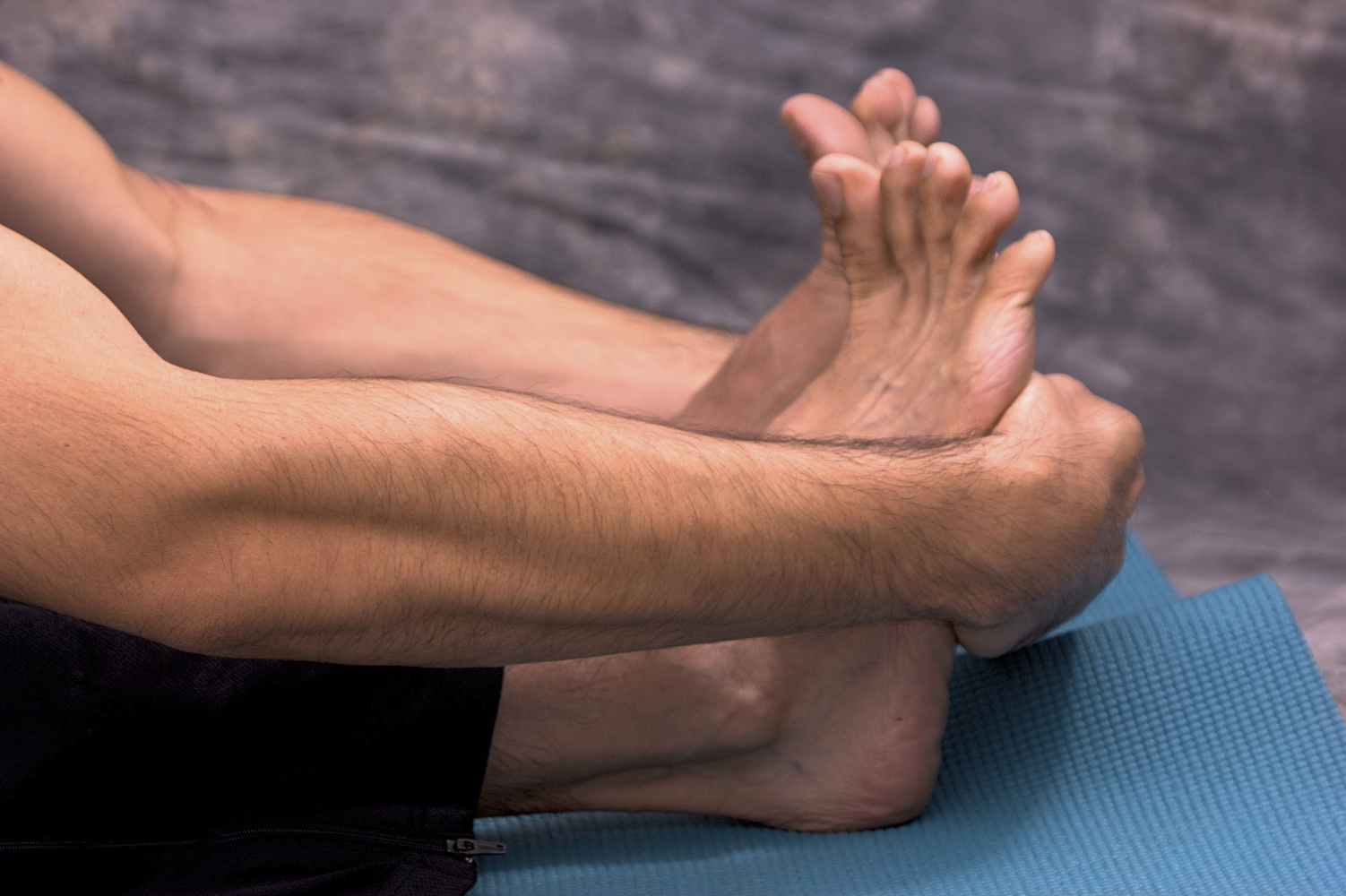 It is very possible that the cause of your hip, back, or knee pain could be your feet. You should try to take care of your feet and make sure that they are strong and healthy so that you can avoid having pain in other areas of your body. One of the simplest exercises you can do to strengthen your feet are toe presses. In order to do this, you should bend your knees, grip the ground with your toes, hold the position for a few seconds, and then release. Another exercise is to walk on your tiptoes for twenty seconds. Doing this can help strengthen the muscles in your toes as well as the ligaments that surround the ball of the foot.
It is very possible that the cause of your hip, back, or knee pain could be your feet. You should try to take care of your feet and make sure that they are strong and healthy so that you can avoid having pain in other areas of your body. One of the simplest exercises you can do to strengthen your feet are toe presses. In order to do this, you should bend your knees, grip the ground with your toes, hold the position for a few seconds, and then release. Another exercise is to walk on your tiptoes for twenty seconds. Doing this can help strengthen the muscles in your toes as well as the ligaments that surround the ball of the foot.
Exercising your feet regularly with the proper foot wear is a great way to prevent injuries and build strength. If you have any concerns about your feet, contact Dr. Steven Schwartz from Pennsylvania. Our doctor can provide the care you need to keep you pain-free and on your feet.
Exercise for Your Feet
Exercise for your feet can help you gain strength, mobility and flexibility in your feet. They say that strengthening your feet can be just as rewarding as strengthening another part of the body. Your feet are very important, and we often forget about them in our daily tasks. But it is because of our feet that are we able to get going and do what we need to. For those of us fortunate enough to not have any foot problems, it is an important gesture to take care of them to ensure good health in the long run.
Some foot health exercises can include ankle pumps, tip-toeing, toe rises, lifting off the floor doing reps and sets, and flexing the toes. It is best to speak with Our doctor to determine an appropriate regimen for your needs. Everyone’s needs and bodies are different, and the activities required to maintain strength in the feet vary from individual to individual.
Once you get into a routine of doing regular exercise, you may notice a difference in your feet and how strong they may become.
If you have any questions please feel free to contact our offices located in Chambersburg, and Mcconnellsburg, PA . We offer the newest diagnostic and treatment technologies for all your foot and ankle needs.
How Your Diet May Lead to Gout
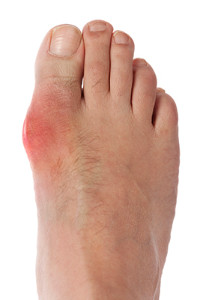 Studies have shown that gout can be triggered by having a diet that is high in purines, so it is important that you avoid foods that contain them in order to keep from developing the condition. Some of these high-purine foods include sardines, anchovies, and scallops. Foods that are high in vitamin-C have been found to lower uric acid levels in the bloodstream, so be sure to include them in your diet if you want to lower your risk of developing gout. You should also try to avoid medications such as aspirin, which can increase your uric acid levels.
Studies have shown that gout can be triggered by having a diet that is high in purines, so it is important that you avoid foods that contain them in order to keep from developing the condition. Some of these high-purine foods include sardines, anchovies, and scallops. Foods that are high in vitamin-C have been found to lower uric acid levels in the bloodstream, so be sure to include them in your diet if you want to lower your risk of developing gout. You should also try to avoid medications such as aspirin, which can increase your uric acid levels.
Gout is a foot condition that requires certain treatment and care. If you are seeking treatment, contact Dr. Steven Schwartz from Pennsylvania. Our doctor will treat your foot and ankle needs.
What Is Gout?
Gout is a type of arthritis caused by a buildup of uric acid in the bloodstream. It often develops in the foot, especially the big toe area, although it can manifest in other parts of the body as well. Gout can make walking and standing very painful and is especially common in diabetics and the obese.
People typically get gout because of a poor diet. Genetic predisposition is also a factor. The children of parents who have had gout frequently have a chance of developing it themselves.
Gout can easily be identified by redness and inflammation of the big toe and the surrounding areas of the foot. Other symptoms include extreme fatigue, joint pain, and running high fevers. Sometimes corticosteroid drugs can be prescribed to treat gout, but the best way to combat this disease is to get more exercise and eat a better diet.
If you have any questions please feel free to contact our offices located in Chambersburg, and Mcconnellsburg, PA . We offer the newest diagnostic and treatment technologies for all your foot and ankle needs.
Summer Footcare Tips
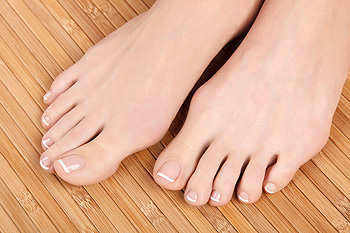 Our feet tend to be at their most vulnerable state during the summer months, when we use them the most. It is essential that you take care of your feet, so that you are free to be able to enjoy your summer activities without experiencing any pain. One of the most crucial tips for taking care of your feet is to not walk around barefoot. Walking without shoes will make you more prone to getting sunburn, athlete’s foot, and other injuries. You should also make sure you are wearing proper footwear that is comfortable and supportive. Sandals and flip-flops may be the most trendy footwear choices, but they do not offer optimum protection for your feet. Lastly, you should also seek medical attention for any problems you may have with your feet. Any untreated foot problem you are experiencing can easily progress into something much worse if you don’t seek treatment for it.
Our feet tend to be at their most vulnerable state during the summer months, when we use them the most. It is essential that you take care of your feet, so that you are free to be able to enjoy your summer activities without experiencing any pain. One of the most crucial tips for taking care of your feet is to not walk around barefoot. Walking without shoes will make you more prone to getting sunburn, athlete’s foot, and other injuries. You should also make sure you are wearing proper footwear that is comfortable and supportive. Sandals and flip-flops may be the most trendy footwear choices, but they do not offer optimum protection for your feet. Lastly, you should also seek medical attention for any problems you may have with your feet. Any untreated foot problem you are experiencing can easily progress into something much worse if you don’t seek treatment for it.
Everyday foot care is very important to prevent infection and other foot ailments. If you need your feet checked, contact Dr. Steven Schwartz from Pennsylvania. Our doctor can provide the care you need to keep you pain-free and on your feet.
Everyday Foot Care
Often, people take care of their bodies, face and hair more so than they do for their feet. But the feet are a very important aspect of our bodies, and one that we should pay more attention to. Without our feet, we would not be able to perform most daily tasks.
It is best to check your feet regularly to make sure there are no new bruises or cuts that you may not have noticed before. For dry feet, moisturizer can easily be a remedy and can be applied as often as necessary to the affected areas. Wearing shoes that fit well can also help you maintain good foot health, as well as making it easier to walk and do daily activities without the stress or pain of ill-fitting shoes, high heels, or even flip flops. Wearing clean socks with closed shoes is important to ensure that sweat and bacteria do not accumulate within the shoe. Clean socks help to prevent Athlete’s foot, fungi problems, bad odors, and can absorb sweat.
If you have any questions please feel free to contact our offices located in Chambersburg, and Mcconnellsburg, PA . We offer the newest diagnostic and treatment technologies for all your foot and ankle needs.
The Importance of Choosing Proper Shoes for Your Child’s Feet
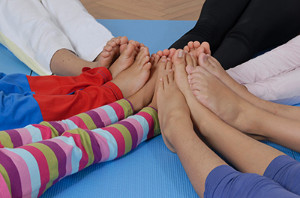 A lot of parents are unknowingly causing harm to their children’s feet by putting them in dangerous footwear. These parents are buying heels for their young girls and flip-flops for their young boys. These two types of shoes should not be worn on a regular basis by anyone, especially children who haven’t had their feet properly develop yet. It is advised that kids do not wear any shoes with a heel larger than two inches because heeled shoes place too much pressure on the ball of the foot. According to a study, “About 55 percent of children had suffered injuries by wearing shoes which were either too small or unsuitable.”
A lot of parents are unknowingly causing harm to their children’s feet by putting them in dangerous footwear. These parents are buying heels for their young girls and flip-flops for their young boys. These two types of shoes should not be worn on a regular basis by anyone, especially children who haven’t had their feet properly develop yet. It is advised that kids do not wear any shoes with a heel larger than two inches because heeled shoes place too much pressure on the ball of the foot. According to a study, “About 55 percent of children had suffered injuries by wearing shoes which were either too small or unsuitable.”
Making sure that your children maintain good foot health is very important as they grow. If you have any questions, contact Dr. Steven Schwartz of Pennsylvania. Our doctor can provide the care you need to keep you pain-free and on your feet.
Keeping Children's Feet Healthy
Having healthy feet during childhood can help prevent medical problems later in life, namely in the back and legs. As children grow, their feet require different types of care. Here are some things to consider...
Although babies do not walk yet, it is still very important to take care of their feet.
Avoid putting tight shoes or socks on his or her feet.
Allow the baby to stretch and kick his or her feet to feel comfortable.
As a toddler, kids are now on the move and begin to develop differently. At this age, toddlers are getting a feel for walking, so don’t be alarmed if your toddler is unsteady or ‘walks funny’.
As your child gets older, it is important to teach them how to take care of their feet.
Show them proper hygiene to prevent infections such as fungus.
Be watchful for any pain or injury.
Have all injuries checked by a doctor as soon as possible.
Comfortable, protective shoes should always be worn, especially at play.
If you have any questions please feel free to contact our offices located in Chambersburg, and Mcconnellsburg, PA . We offer the newest diagnostic and treatment technologies for all your foot and ankle needs.
Jon Gray Suffers Stress Fracture in Left Foot
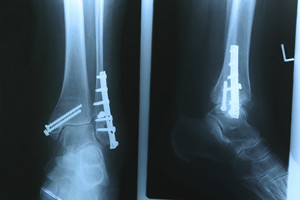 Jon Gray of the Colorado Rockies has been out since April with a stress fracture in his left foot. The Rockies have already been off to a tremendous start, with a record of 47-31. Gray’s return to the starting rotation is expected to help give the Rockies the extra boost they need to keep pace with the rest of the division. The team is expected to go back to a five man rotation with Gray’s return, which means one current pitcher is expected to be cut. Jon Gray’s return is expected to take place during the Rockies’ series against the Diamondbacks next weekend.
Jon Gray of the Colorado Rockies has been out since April with a stress fracture in his left foot. The Rockies have already been off to a tremendous start, with a record of 47-31. Gray’s return to the starting rotation is expected to help give the Rockies the extra boost they need to keep pace with the rest of the division. The team is expected to go back to a five man rotation with Gray’s return, which means one current pitcher is expected to be cut. Jon Gray’s return is expected to take place during the Rockies’ series against the Diamondbacks next weekend.
Activities where too much pressure is put on the feet can cause stress fractures. To learn more, contact Dr. Steven Schwartz from Pennsylvania. Our doctor can provide the care you need to keep your pain free and on your feet.
Dealing with Stress Fractures of the Foot and Ankle
Stress fractures occur in the foot and ankle when muscles in these areas weaken from too much or too little use. The feet and ankles then lose support when walking or running from the impact of the ground. Since there is no protection, the bones receive the full impact of each step. Stress on the feet can cause cracks to form in the bones, thus creating stress fractures.
What Are Stress Fractures?
Stress fractures occur frequently in individuals whose daily activities cause great impact on the feet and ankles. Stress factors are most common among:
- Runners
- People affected with Osteoporosis
- Tennis or basketball players
- Gymnasts
- High impact workouts
Symptoms
Pain from the fractures occur in the area of the fractures and can be constant or intermittent. It will often cause sharp or dull pain with swelling and tenderness. Engaging in any kind of activity which involves high impact will aggravate pain.
If you have any questions please feel free to contact our offices located in Chambersburg, and Mcconnellsburg, PA . We offer the newest diagnostic and treatment technologies for all your foot and ankle needs.
What to Look for When Searching for Running Shoes
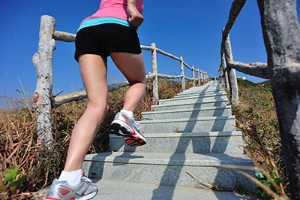 There are certain features that you should ensure your shoes have before you decide to start running. It is crucial that your shoe has arch support, cushioning, and traction in order to improve your running mechanics. The amount of support that you need in your shoe depends greatly on the arch of your foot. For example, people who have feet with high arches do not need shoes with a lot of support, since these may result in injury for them. It is important that you are aware of what type of foot arch you have so that you can find the perfect running shoe for you. Your podiatrist can help you evaluate your foot arch height as well as other factors that will help determine what running shoe you should purchase.
There are certain features that you should ensure your shoes have before you decide to start running. It is crucial that your shoe has arch support, cushioning, and traction in order to improve your running mechanics. The amount of support that you need in your shoe depends greatly on the arch of your foot. For example, people who have feet with high arches do not need shoes with a lot of support, since these may result in injury for them. It is important that you are aware of what type of foot arch you have so that you can find the perfect running shoe for you. Your podiatrist can help you evaluate your foot arch height as well as other factors that will help determine what running shoe you should purchase.
If you are a runner, wearing the right running shoe is essential. For more information, contact Dr. Steven Schwartz from Pennsylvania. Our doctor can provide the care you need to keep you pain-free and on your feet.
Choosing the Right Running Shoe for Your Foot Type
To increase performance and avoid the risk of injury, it is important to choose the right running shoe based on your foot type. The general design of running shoes revolves around pronation, which is how the ankle rolls from outside to inside when the foot strikes the ground.
- Neutral runners are able to choose from a wide variety of shoes, including minimalist shoes or even going barefoot.
- Runners who overpronate, or experience an over-abundance of ankle rolling, should choose shoes that provide extra motion control and stability.
- Runners who underpronate, or supinate, have feet that have high arches and lack flexibility, preventing shock absorption. They require shoes with more flexibility and cushion.
If you have any questions please feel free to contact our offices located in Chambersburg, and Mcconnellsburg, PA . We offer the newest diagnostic and treatment technologies for all your foot and ankle needs.
Ways to Avoid Injury While Running
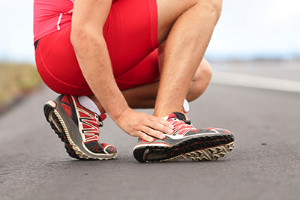 Injuries can be a major setback for people who love to run, so it is important that you take preventative measures in order to avoid them. One of the most vital tips for avoiding injury is to ease your way into any new routine. Jumping into more than you can handle is a common cause of injury for runners. Another tip is to buy appropriate shoes for your running workout. There are major differences between shoes that are built for walking, running, and cross-training; it is crucial that you choose footwear that is most suitable for your routine. Resting is also important so that you do not overwork your body. The human body isn’t built to do high-intensity workouts every day, so you should incorporate rest days into your schedule. Lastly, stretching is essential to every running routine. Always stretch before and after a run.
Injuries can be a major setback for people who love to run, so it is important that you take preventative measures in order to avoid them. One of the most vital tips for avoiding injury is to ease your way into any new routine. Jumping into more than you can handle is a common cause of injury for runners. Another tip is to buy appropriate shoes for your running workout. There are major differences between shoes that are built for walking, running, and cross-training; it is crucial that you choose footwear that is most suitable for your routine. Resting is also important so that you do not overwork your body. The human body isn’t built to do high-intensity workouts every day, so you should incorporate rest days into your schedule. Lastly, stretching is essential to every running routine. Always stretch before and after a run.
Exercising your feet regularly with the proper foot wear is a great way to prevent injuries. If you have any concerns about your feet, contact Dr. Steven Schwartz of Pennsylvania. Our doctor will treat your foot and ankle needs.
How to Prevent Running Injuries
Many common running injuries are caused by overuse and overtraining. When the back of the kneecap starts wearing out and starts causing pain in your knee, this is commonly referred to as runner’s knee. Runner’s knee is a decrease in strength in your quadriceps and can occur if you’re not wearing properly fitted or supporting shoes. To prevent runner’s knee, focusing on hip strengthening is a good idea, as well as strengthening your quads to keep the kneecaps aligned.
What Are Some Causes of Running Injuries?
- One cause of a common running injury is called iliotibial band syndrome.
- Plantar fasciitis is also another common injury.
- Stress fractures can occur from overtraining, lack of calcium, or even your running style.
Best Ways to Prevent Running Injuries
- Wear footwear that fits properly and suits your running needs.
- Running shoes are the only protective gear that runners have to safeguard them from injury.
- Make a training schedule. Adding strengthening exercises as well as regular stretching can help keep you strong and limber and can lessen the possibility of injuries.
- Stretching keeps muscles limber; this will help you gain better flexibility.
If you have any questions please feel free to contact our offices located in Chambersburg, and Mcconnellsburg, PA . We offer the newest diagnostic and treatment technologies for all your foot and ankle needs.
Yoenis Cespedes Exits Game With Heel Pain
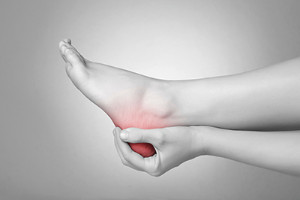 In his second game back from recovering from a hamstring strain, Mets outfielder Yoenis Cespedes exited the second inning with pain in his left heel. Cespedes has been dealing with heel pain ever since he left Cuba and claims that he has always played through it. Cespedes was seen limping on the field prior to the fifth inning but insisted that the pain would go away on its own. Regardless, manager Terry Collins took the outfielder out of the game and stated, “I know he wanted to play and stay in, and he wasn’t happy about coming out, but as I tried to explain, the whole big picture is: ‘We’ve got to keep you in as many games as we possibly can.'”
In his second game back from recovering from a hamstring strain, Mets outfielder Yoenis Cespedes exited the second inning with pain in his left heel. Cespedes has been dealing with heel pain ever since he left Cuba and claims that he has always played through it. Cespedes was seen limping on the field prior to the fifth inning but insisted that the pain would go away on its own. Regardless, manager Terry Collins took the outfielder out of the game and stated, “I know he wanted to play and stay in, and he wasn’t happy about coming out, but as I tried to explain, the whole big picture is: ‘We’ve got to keep you in as many games as we possibly can.'”
Many people suffer from bouts of heel pain. For more information, contact Dr. Steven Schwartz of Pennsylvania. Our doctor can provide the care you need to keep you pain-free and on your feet.
Causes of Heel Pain
Heel pain is often associated with plantar fasciitis. The plantar fascia is a band of tissues that extends along the bottom of the foot. A rip or tear in this ligament can cause inflammation of the tissue.
Achilles tendonitis is another cause of heel pain. Inflammation of the Achilles tendon will cause pain from fractures and muscle tearing. Lack of flexibility is also another symptom.
Heel spurs are another cause of pain. When the tissues of the plantar fascia undergo a great deal of stress, it can lead to ligament separation from the heel bone, causing heel spurs.
Why Might Heel Pain Occur?
- Wearing ill-fitting shoes
- Wearing non-supportive shoes
- Weight change
- Excessive running
Treatments
Heel pain should be treated as soon as possible for immediate results. Keeping your feet in a stress-free environment will help. If you suffer from Achilles tendonitis or plantar fasciitis, applying ice will reduce the swelling. Stretching before an exercise like running will help the muscles. Using all these tips will help make heel pain a condition of the past.
If you have any questions please contact our offices located in Chambersburg, and Mcconnellsburg, PA . We offer the newest diagnostic and treatment technologies for all your foot and ankle needs.
Dealing with Plantar Warts
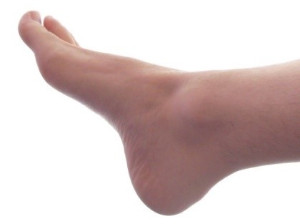 Plantar warts are caused by the human papillomavirus (HPV). This virus thrives in warm, damp environments such as gym showers or other public facilities. In special cases, untreated plantar warts may develop into methicillin-resistant staphylococcus aureus (MRSA). Although sometimes plantar warts may go away on their own, if they are chronic or become painful you should consult with a podiatrist to go over treatment options.
Plantar warts are caused by the human papillomavirus (HPV). This virus thrives in warm, damp environments such as gym showers or other public facilities. In special cases, untreated plantar warts may develop into methicillin-resistant staphylococcus aureus (MRSA). Although sometimes plantar warts may go away on their own, if they are chronic or become painful you should consult with a podiatrist to go over treatment options.
Plantar warts can be very uncomfortable. If you need your feet checked, contact Dr. Steven Schwartz from Pennsylvania. Our doctor will assist you with all of your foot and ankle needs.
About Plantar Warts
Plantar warts are the result of HPV, or human papillomavirus, getting into open wounds on the feet. They are mostly found on the heels or balls of the feet.
While plantar warts are generally harmless, those experiencing excessive pain or those suffering from diabetes or a compromised immune system require immediate medical care. Plantar warts are easily diagnosed, usually through scraping off a bit of rough skin or by getting a biopsy.
Symptoms
- Lesions on the bottom of your feet, usually rough and grainy
- Hard or thick callused spots
- Wart seeds, which are small clotted blood vessels that look like little black spots
- Pain, discomfort, or tenderness of your feet when walking or standing
Treatment
- Freezing
- Electric tool removal
- Laser Treatment
- Topical Creams (prescription only)
- Over-the-counter medications
To help prevent developing plantar warts, avoid walking barefoot over abrasive surfaces that can cause cuts or wounds for HPV to get into. Avoiding direct contact with other warts, as well as not picking or rubbing existing warts, can help prevent the further spread of plantar warts. However, if you think you have developed plantar warts, speak to your podiatrist. He or she can diagnose the warts on your feet and recommend the appropriate treatment options.
If you have any questions please feel free to contact our offices located in Chambersburg, and Mcconnellsburg, PA . We offer the newest diagnostic and treatment technologies for all your foot and ankle needs.
How To Treat Your Hyperhidrosis
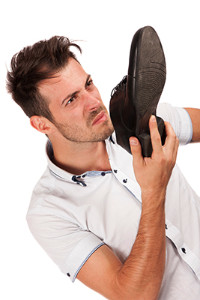 Hyperhidrosis, or excessive sweating, occurs when the body produces more sweat than what is necessary in order to regulate body temperature. Approximately 7 million Americans suffer from the condition, and many who have it don’t realize they do; it is very common for this condition to go undiagnosed. People with the condition often want to avoid social situations, especially those that involve shaking hands. Hyperhidrosis can occur all over the body, or only in certain parts. The feet are a common area to experience the effects of hyperhidrosis due to the high concentration of sweat glands in them.
Hyperhidrosis, or excessive sweating, occurs when the body produces more sweat than what is necessary in order to regulate body temperature. Approximately 7 million Americans suffer from the condition, and many who have it don’t realize they do; it is very common for this condition to go undiagnosed. People with the condition often want to avoid social situations, especially those that involve shaking hands. Hyperhidrosis can occur all over the body, or only in certain parts. The feet are a common area to experience the effects of hyperhidrosis due to the high concentration of sweat glands in them.
If you are suffering from hyperhidrosis contact Dr. Steven Schwartz of Pennsylvania. Our doctor can provide the care you need to attend to all of your foot and ankle needs.
Hyperhidrosis of the Feet
Hyperhidrosis is a rare disorder that can cause people to have excessive sweating of their feet. This can usually occur all on its own without rigorous activity involved. People who suffer from hyperhidrosis may also experience sweaty palms.
Although it is said that sweating is a healthy process meant to cool down the body temperature and to maintain a proper internal temperature, hyperhidrosis may prove to be a huge hindrance on a person’s everyday life.
Plantar hyperhidrosis is considered to be the main form of hyperhidrosis. Secondary hyperhidrosis can refer to sweating that occurs in areas other than the feet or hands and armpits. Often this may be a sign of it being related to another medical condition such as menopause, hyperthyroidism and even Parkinson’s disease.
In order to alleviate this condition, it is important to see your doctor so that they may prescribe the necessary medications so that you can begin to live a normal life again. If this is left untreated, it is said that it will persist throughout an individual’s life.
A last resort approach would be surgery, but it is best to speak with your doctor to find out what may be the best treatment for you.
If you have any questions please feel free to contact our offices located in Chambersburg, and Mcconnellsburg, PA . We offer the newest diagnostic and treatment technologies for all your foot and ankle needs.

